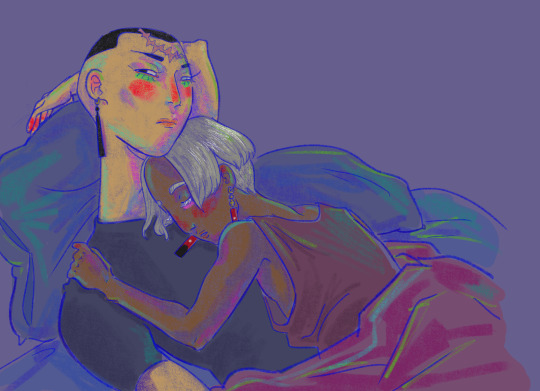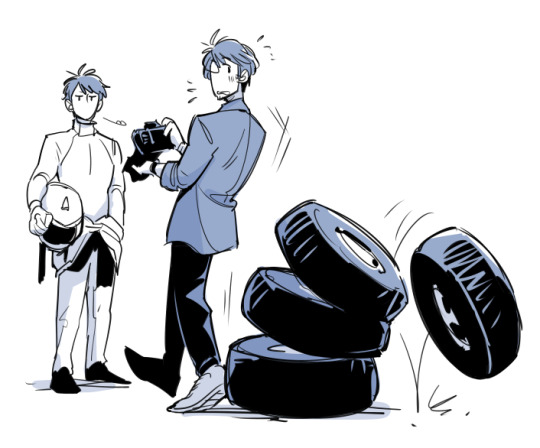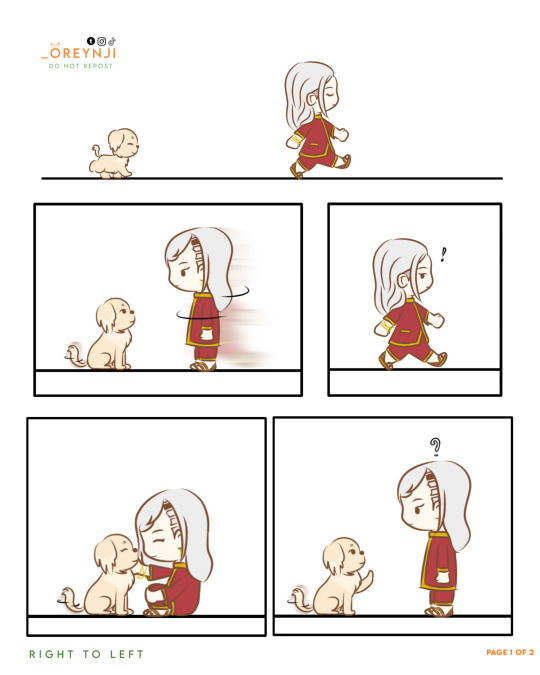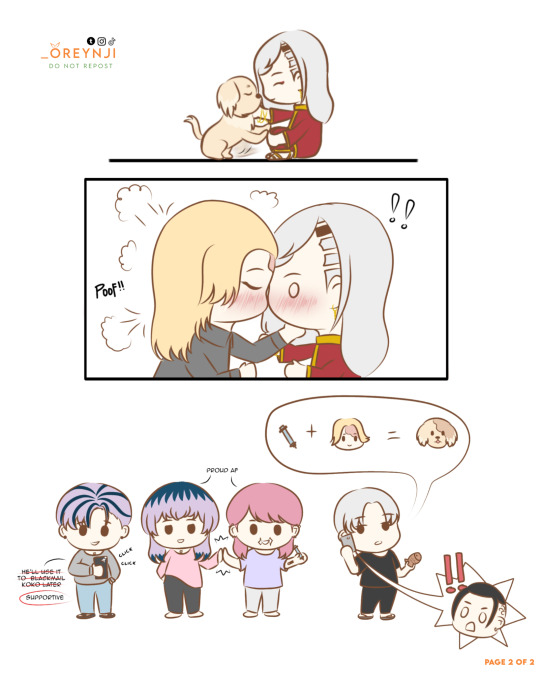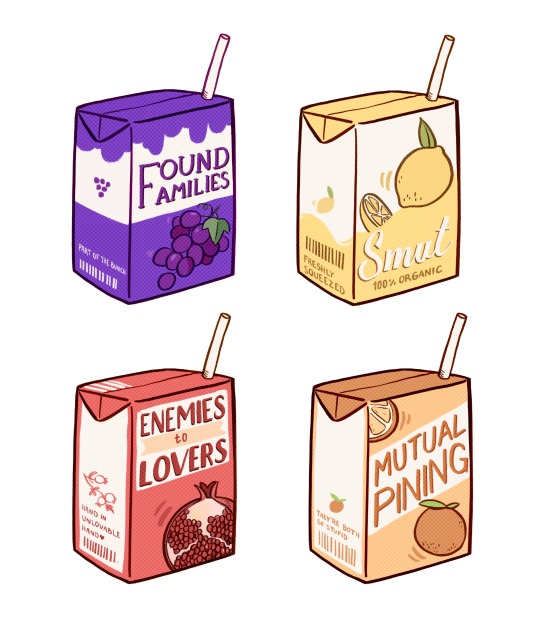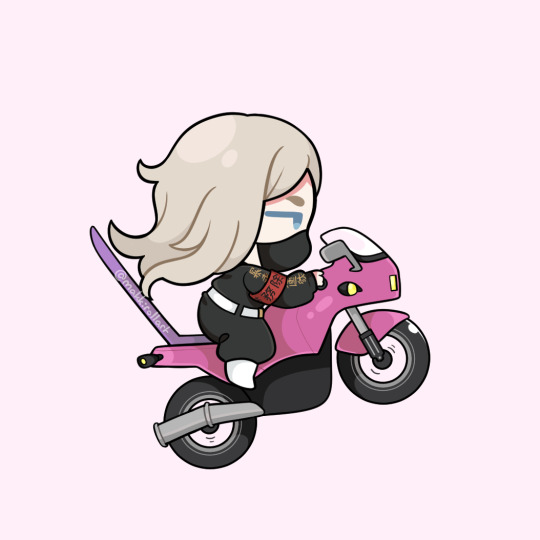Text

Wanted to post this here too since its not super nsfw 💌
29 notes
·
View notes
Text

This. Plus the sheer guilt writers feel when they’re not writing, because they feel like they should be writing right now. But what they do is ‘anything to make sure they avoid writing’.
The struggle is very much real.
558 notes
·
View notes
Text
Some doodles of my rollercoaster emotions in ch 268


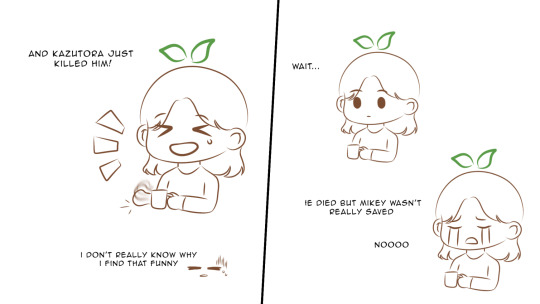

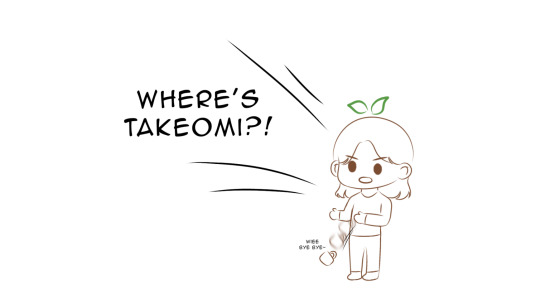

48 notes
·
View notes
Text
"We'll make a country where the people are those with no relatives. We'll make a home for them."
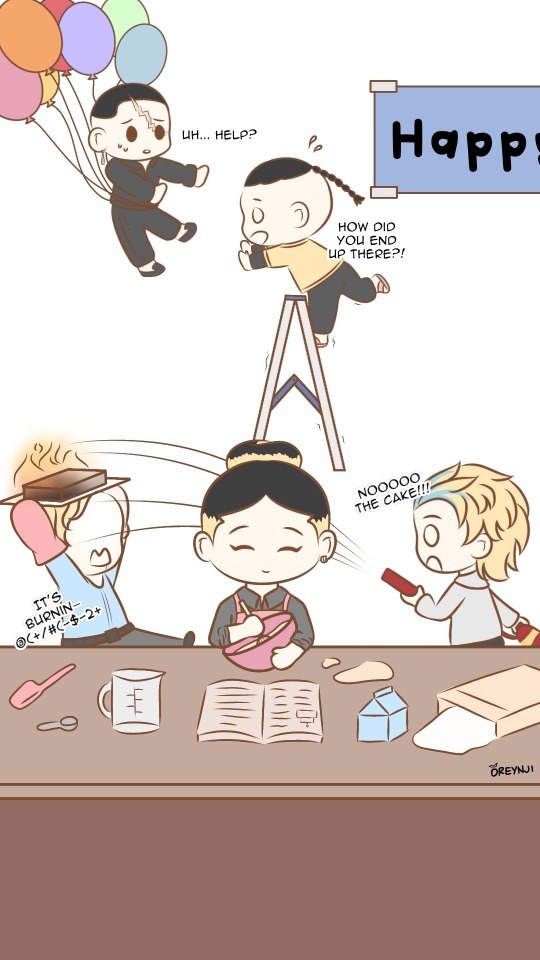
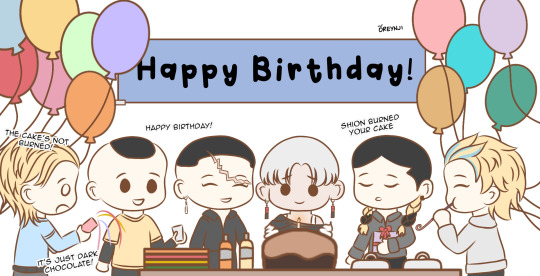

700 notes
·
View notes
Text
Tenjiku : Hanafuda and Flower Symbolism
Edit : Well, I’ll admit that I never imagined that this post would be so successful, thank you very much ? I went to correct some typos as well as bring a slight precision in Rindou’s part :)
Disclaimer : This post was made because I’m an absolute floriography nerd and the Hanafuda kinda got caught up in it. I am in no way a specialist on the subject so if you notice some errors or wish to add a nuance to the subject, do not hesitate to contact me by asks or a reblog with your addition 🙂
Hanafuda (花札 - “Flower Cards”)
One of Tenjiku’s unofficial symbols is the Hanafuda, courtesy of Kurokawa Izana and his signature earrings.
As indicated by the title, Hanafuda suites are flower-based (or at least plant-based) and an interesting fact is that most of the executive members of Tenjiku have flower-related names. And those that don’t have Hanafuda-related meanings.
So here is in this post a resumption of some analyzes that I had previously done in this post, but in a more detailed and readable way.
Kurokawa Izana (August) - Silver Grass, Full Moon, Peony
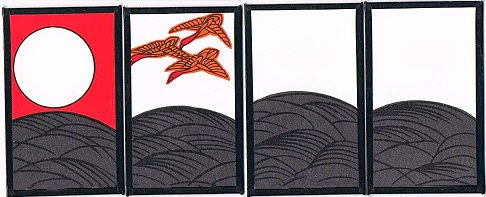
Izana was quite complicated to begin with, his first name not being in kanji and his last name having no relation to the hanafuda or the flowers. However, he’s the one wearing Hanafuda card earrings, so let’s take a look at his suite.
The card he wears as earring is “Susuki ni Tsuki”, the first card of the August suite, his birth month. The “flower” associated with this month is Miscanthus sinensis i.e Silver Grass. It’s a plant used in Japanese Flower and Bird art and therefore, it has a meaning. It’s a symbol of autumn, to be understood here as a transition between summer and winter, winter representing Tenjiku.
It’s also a symbol of loneliness.
‘Susuki ni Tsuki’ depicts a full moon in a blood red sky, above a grassy hill. It represents ’Tsukimi’, or moon viewing, the autumnal counterpart to cherry blossom viewing (Hanami) in spring. It’s also called the ‘Harvest moon’ or 'Hunter’s moon’, because the moonlight allowed workers to pursue their activities even after nightfall.
For the peonies, they come from the outfit Izana wears on the cover of volume 17 : 牡丹 tree peony (Paeonia suffruticosa); moutan. Thanks to @hemorrhagia for the picture and the translation !

So, peonies. In Japanese art, they are a symbol of : winter, spring, fertility, power, happiness, love and prosperity. In Hanakotoba, they mean majesty and wealth, which is quite different from their Victorian counterparts where they mean bashfulness.
Another interesting thing is the caption made by Wakui about his choice of design : “The image is that of an audience with the emperor”. Keep that in mind, because it will come back to it later.
Kakucho (Unknown) - Crane, Butterfly
The name Kakucho means “crane, stork” (鶴) (kaku) and “butterfly” (蝶) (chou). We don’t know much about Kakucho, like his first name or date of birth. I know “Hitto” is commonly used in fandom as his first name, but I have no idea where that came from. As for his lack of date of birth, it handicapped me to find his Hanafuda suite… Until I realized that the animals of his name, crane and butterfly, were both present in the Hanafuda.
First suite: Crane and Pine, January.
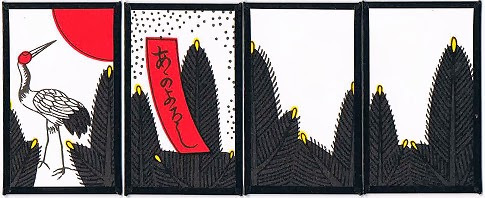
Red-crowned Cranes are also known as Japanese Cranes or Manchurian Cranes and along with the Pine Tree, are a well known symbol of winter and longevity. Amusing fact, red-crowned cranes are said to mate for life, making them a symbol of fidelity and marital harmony.
Sixth suite: Peony and Butterflies, June.
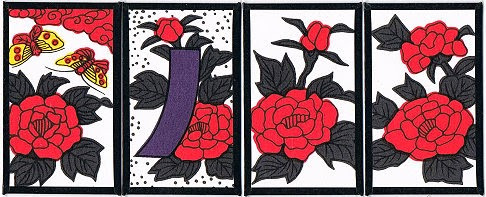
Interestingly enough, we find the peonies used for Izana’s outfit in this suite. However, what interests me the most is the symbolism of the butterfly. According to popular Japanese belief, butterflies are the 'soul of the living and the dead’, spirits of the dead taking the form of a butterfly when on their journey to the other world and eternal life.
There is also a very popular legend, Butterfly Lovers, considered the Asian Romeo and Juliet, about two lovers turning into butterflies. Butterflies are also a symbol of love and marital happiness, especially if two butterflies are depicted together.
Mochizuki Kanji (March) - Full Moon, Cherry Blossom
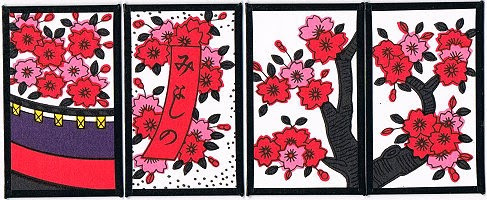
The name Kanji means “complete” (完爾). Kanji’s surname Mochizuki means “wish, desire, hope” (望) (mochi) and “moon” (月) (tsuki/zuki), which literally means “full moon” altogether. No flower here, but links to Hanafuda !
Firstly , his name meaning “full moon” can directly refer to Izana’s Hanafuda card, which represents a full moon.
Secondly, his birth month is March, which corresponds to the cherry blossom series of the Hanafuda. There is a parallel that can be made between Hanami (Cherry Blossom Viewing) and Tsukimi (Full Moon Viewing) which respectively represent the series of March (Mochi) and August (Izana). As a reminder, Tsukimi is often considered as the automnal counterpart of Hanami.
Also, the second card of the cherry blossom suite is interesting to look at. On the scroll, there is the word ’Miyoshino’. 'Mi’ is a term of respect and ‘Yoshino’ is the place name. It refers to Mt. Yoshino, known for its more than 30,000 cherry trees which offer a magnificent spectacle. It was a place highly appreciated by the emperor, thus, ancient Japanese people called the place ‘Miyoshino’ out of respect for their Emperor.
I refer you back to Wakui’s description of Izana’s outfit.
Madarame Shion (March) - Aster, Cherry Blossom

The name Shion means “lion” (獅) (shi) and “sound” (音) (on). Shion’s surname Madarame means “rash, spot, unevenness, irregularity” (斑) (madara) and “eye, ogle” (目) (me). But Shion (しおん) is also tatarian aster (the kanji used to spell his name aren’t related to flowers, but his name in romaji is a flower). Once again, thanks to hemorrhagia !
Aster tataricus (tatarian aster) means remembrance in Hanakotoba, and more specifically “I won’t forget you”.In Victorian language, I had to dig a bit since the meaning can change drastically depending on the color of the flower. For example, aster’s main meaning is “wisdom”, “love” and “faith”. But Red Asters means “undying devotion”.
And just like Mochi, Shion is linked to the series of Mars, the cherry blossom. Which brings us to the very meaning of cherry blossoms : spring, summer, beauty, delicacy, loyalty, prosperity, ephemerality. The last one is particularly important, because it’s a symbol of the brevity and uncertainty of life.
Haitani Ran (May) - Orchid, Iris
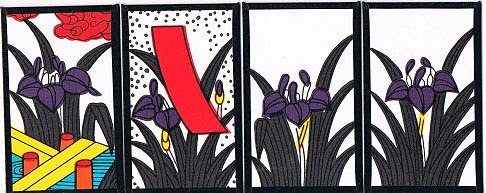
The name Ran means “orchid” (蘭). Haitani means “ash” (灰) (hai) and “valley” (谷) (tani).
Fun fact, since orchids are not native to Japan, they have no meaning of their own in Hanakotoba. The closest thing I could find would be the meaning of “special”, “rare” or “expensive” due to their popularity with nobles. In Victorian Floriography, it means “elegance” and “beauty”, Which isn’t too bad for Ran’s character either, since we got Mitsuya’s point of view on the Haitani brothers recently.
His Hanafuda suite is that of the month of May, linked to the Iris. There is quite an interesting story related to the 'Ayame ni Yatsuhashi’ card. During the era of the Tokugawa Shogun, he required every Lord to spend part of the year in Edo (Tokyo) and part in their home province. The expense of keeping two households and of traveling back and forth between the capital and home meant that no rival could become powerful enough to challenge the Shogun. When the Lords returned home their families were also kept as hostages in Edo. This ensured that they would stay loyal to the Shogun.
Now I’ll let you think back to Kakucho’s failure story in the new character book and the fact that the Haitani brothers are literally running Roppongi.
Haitani Rindou (October) - Gentian, Maple Leaf
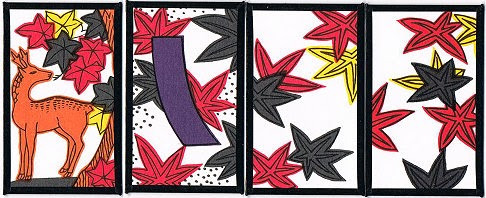
The name Rindo means “gentian, bellflower” (竜胆). Haitani means “ash” (灰) (hai) and “valley” (谷) (tani).
Gentians symbolize victory. It’s for this reason that they were used for the victory bouquet of the Tokyo Olympics. When it comes to Victorian language, again there are loads of different meanings, one of the most recurring being “charm”.
Amusingly, it is also considered a “sad” flower, a funeral flower.
As for his Hanafuda sequel, Rindou was born in October, which gives him the Maple suite. Among the meanings of maple that often come up are the meaning of “treasured memories” and “beautiful change”.
We find in the maple suite the representation of the Sika deer, which associated with the maple is a symbol of longevity.
A fun fact is that Kannazuki (October) can be interpreted two ways : it can be read as the 'month of Gods’ (Kaminazuki) or 'month without Gods’ (Kannazuki).
EDIT : Thanks to a really nice anon, I learned that more than a difference in interpretations, it’s a regional difference !
The gods are said to gather in Izumo Taisha during this time, so for most of Japan it’s the month without gods, while for the Izumo region it’s the month with gods ! Also just wanted to add that the generally used term would be Kannazuki, and Kamiarizuki in the Izumo region/former Izumo province !
Muto Yasuhiro (April) - Wisteria
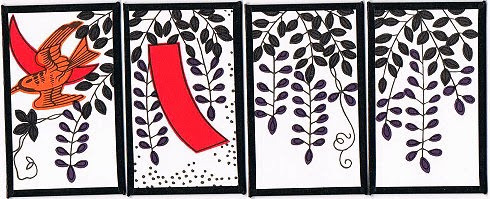
The name Yasuhiro means “peaceful, calm, peace, easy, Thailand” (泰) (yasu) and “wide, large” (宏) (hiro). Mucho’s surname Mutou means “military, martial” (武) (mu) and “wisteria” (藤) (tou). Here we have a jackpot: the flower is both in his name and in the Hanafuda suite of his birth month.
In hanakotoba, Wisteria has different meanings. And among its meanings, one of the most common is “welcome”, in the sense of “we welcome you”, often associated also with the other meaning of “kind”.On the symbolic side, wisterias are a symbol of longevity (some wisterias are over 140 years old). There is an awful amount of possible symbolism for this flower, but this one is undoubtedly the most important.
In the Victorian language of flowers, however, and therefore on the side of Western symbolism, it is above all the growing pattern of the wisteria that gave it a meaning: “I cling to you”. It was a “warning flower”, representing love in the context of obsession and not wanting to let go.
April’s suite also features an animal, the lesser cuckoo, which symbolizes : summer, unrequited love, past emotions, sadness. The first card of the suite, 'Fuji ni Kakku’, refers to the story of the samurai Yorimasa, who came out of retirement to slay a monster for his Emperor. It signifies honor and advancement in status.
Also, the call of the Cuckoo is said to sound like someone calling, ‘return home’.
When I made my first post, I was already very satisfied with everything I had found for Mucho, but by adding the Hanafuda suite, we have even more symbolism.
327 notes
·
View notes
Text
I’m–!
I have not been able to figure out why the Shiba family’s last name is Shiba of all things. It means firewood, like? Okay?? It makes no sense for them to have such a basic bitch name when there’s an entire arc dedicated to them.
Especially since Mikey is paralleled with Yuzuha.
Well, I figured it out and I’m so annoyed at 4am right now. I can’t believe I didn’t notice this earlier…
3 Deities, right? It refers to actual deities.
Brahma, Vishnu, and Shiva.
There are 3 families of 3 siblings.
Akashi, Sano, Shiba.
Do you see it?
DO YOU FUCKING SEE IT!?
There’s no V in Japanese… It’s a B.
Shiba = Shiva. It’s–
It was staring me in the face the whole time.
SHIBA = SHIVA
AKASHI = BRAHMA (clearly!!)
SANO = VISHNU
I’m so mad…
DID YOU KNOW THAT AKKUN’S NAME MEANS LEADERSHIP BARBER!?!?! BECAUSE IT DOES!!!!
(┛ಠ_ಠ)┛彡┻━┻
42 notes
·
View notes
Photo

01/08 - Shinichiro kissing is vice-president for his birthday cause i have no self control
89 notes
·
View notes
Text
Mint Chocolate And A Hint Of Caramel | YuzuSen |
Some weeks passed from the sudden encounter with Brahman's boss, which turned out to be a short, energetic, cutie. Using their uniform to hide her female features, she wouldn't blame her, since this was very much still a man's world, despite that, she created quite the reputation for herself, girl or not, she had to admit that was an impressive achievement, that she was rightfully proud of.
All that was put to test with how clingy she'd gotten to her, after their first meet, the short haired girl wouldn't leave her alone, regardless of how many times she would show unintrest verbally and physically in hanging out with her, dismissing her begging, no one had ever went as far as to beg for her time, still, she refused.
This repetitive routine continued undisturbed, until, she decided to step up her game, instead of annoying pleading, she decided to change her tactics, because, it was obvious they weren't giving any positive results, the idea caught her attention while eating her now-regular dose of mint choco ice cream, she'd "carefully" analyzed the cons of said plan, knowing the brunette's home life and all, her wonderful idea was risky, but revolutionary, standing next to her bedroom window, a brilliant tactic.
"WHAT THE FUCK ARE YOU DOING?! YOU'RE GONNA FALL!"
Yuzuha yelled in a whispery voice, noticing the middle schooler's current whereabouts, shocked and confused at why she would go to such lenghts, knowing that Taiju was home only made her worries grow, she could get severely hurt, if not from the fall, it would be because of him, and she couldn't allow this, not Senju, not her annoying, loud and pretty Senju, so she opened the window and carefully exited her bedroom, grabbing Senju's hand.
"Does this count as a date?"
The white haired girl asked confused, as the other one was attemping to gain balance, looking back at her, she gave a small smile, surprisingly embarrassing her, she was rather adorable right now, and the sight of it began melting the seemingly-rude girl's heart, it was uncertain if the bright red on both their cheecks was the effect of a hot summer's day, or if both of their hearts were dancing happily at the sudden warm feeling they felt, it was like a little fireplace.
"Maybe, where do you wanna go first?"
19 notes
·
View notes
